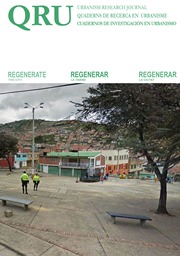Construir ciudad en el espacio residencial cotidiano: reflexiones sobre la vivienda social más allá del alojamiento
DOI:
https://doi.org/10.5821/qru.9623Abstract
Current dynamics on Colombian urbanization trends is characterized by increasing conditions of inequality (deficiencies in the configuration and quality in the public space, access to urban land, available area per person, materials used, among others) and environmental deterioration plus low governability and low governance levels, where the most affected are the most vulnerable population. On the academic realm, reflections raised from the Architecture point of view, motivate questions about contributions to the change of the trend, the construction of better cities and inputs in the development of a framework able to conceive social housing beyond mere accommodation. Approaching this issue from the concept of habitat, recognizing the important relationships between the city; the environment and the housing realm, as well as the indicators used to evaluate their quality and relate it to social, cultural and political spaces, seems not only pertinent but necessary from an ethical commitment of the discipline.In this article the views of some teachers from the Department of Architecture of the Universidad de los Andes in Bogotá, Colombia, converge in an attempt to give unity to the reflections that individually or collectively have been advanced in recent years. The reflections on how the residential habitat is being produced, both from the formal and informal management, from the public operation and the private operation and the interpretations that the actors have of its conception and production, aim to contribute to the construction and the demand of the city with a residential space of high quality.Downloads
Issue
Section
License
Those authors who have publications with this journal, accept the following terms:
a. Authors will retain their copyright and guarantee the journal the right of first publication of their work, which will be simultaneously subject to the Creative Commons CC BY-NC-ND-4.0 recognition license that allows third parties to share the work provided that its author and its first publication are indicated in this journal, but they cannot be changed or used commercially.
b. Authors may adopt other non-exclusive license agreements for the distribution of the version of the published work (eg: deposit it in an institutional telematic archive or publish it in a monographic volume) provided that the initial publication in this journal is indicated.
c. Authors are allowed and recommended to disseminate their work through the Internet (e.g. in institutional telematic files or on their website) before and during the submission process, which can lead to interesting exchanges and increase citations. of the published work. (See The effect of open access).













